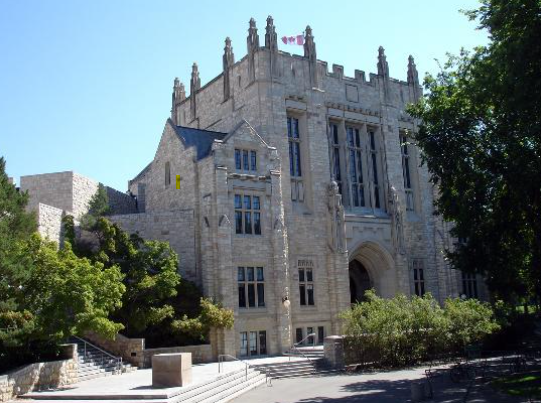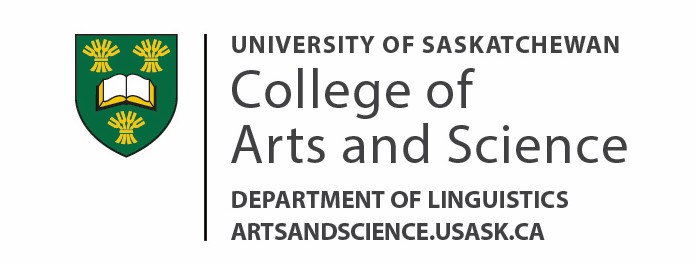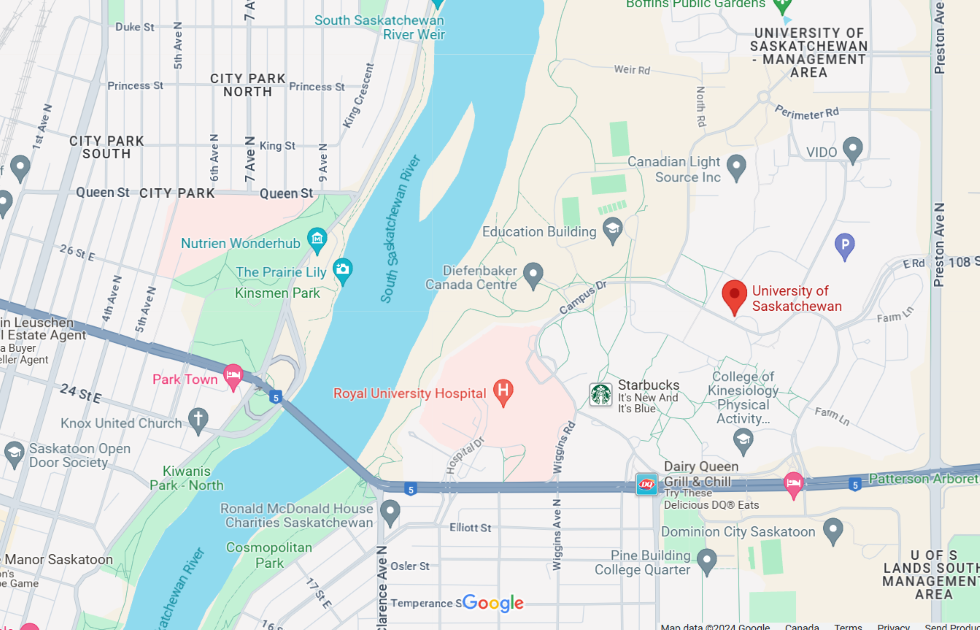Bilingualism and Multilingualism Conference (BAM 2)
May 9-11, 2025, Saskatoon, Saskatchewan

The BAM 2 (Bilingualism and Multilingualism) conference will be held in Saskatoon, Saskatchewan, at the University of Saskatchewan Campus on May 9-11, 2025.
The conference theme is “Multidisciplinary and Interdisciplinary Approaches to Adult and Child Bilingualism and Multilingualism.”
We welcome submissions on any topics related to the conference theme from multiple disciplines, as well as interdisciplinary studies.
Please note that the conference does not offer any visa support. Before submitting an abstract from overseas, we advise checking the prices for a flight to Saskatoon from your location.
Speakers
The conference plenary speakers are:
- Maria Polinsky (University of Maryland, USA)
- Sviatlana Karpava (University of Cyprus)
- Fangfang Li (University of Lethbridge, Canada)
- Alla Nedashkivska (University of Alberta)
- Hynjung Shin (University of Saskatchewan)
- Veronika Makarova (University of Saskatchewan, Canada)
- Elena Nicoladis (University of British Columbia, Canada)
Conference history and goals
The first conference on Bilingualism and Multilingualism (BAM 1) was held in May 2023 at the University of British Columbia. Due to the conference's success, the UofS is hosting a sequel event in May (9-11), 2025. We feature the presentations by the world’s leading scholar in bi-multilingualism and heritage language studies Professor Maria Polinsky, the author of “Heritage Languages and Linguistics” (Cambridge Univ. Press, 2021); Dr. Sviatlana Karpava, a prominent European scholar of multilingualism and ESL, Canada’s own Professor Elena Nicoladis renowned for her psycholinguistic studies of bi-multilingualism, and other prominent Canadian and international scholars. Indigenous, minority, and heritage languages of Canada and other countries will be represented in the talks. The main purpose of the conference is to highlight recent developments in the research areas of bilingualism and multilingualism and to provide researchers with a forum for meeting and synergizing their efforts, primarily at the national level, while engaging with international scholars as well. Bilingualism and multilingualism (B&M) is a fast-growing interdisciplinary area that includes examining the phenomenon from the perspectives of multiple disciplines, such as anthropology, applied linguistics, cognitive science, education, ethnic studies, indigenous studies, linguistics, psychology, second and additional language acquisition, sociolinguistics, and others. B&M has significant impacts on education (especially multilingual education) as well as on equity, diversity and inclusion in Canadian society. Interest in bi-multilingualism conferences has spiked around the world, with multiple international conferences being organized, such as ISB (2023, Australia; 2025 Spain), MAMM (2022, Cyprus), MML (2024, Yerevan, Armenia), etc. Yet, there is no analogous national conference in Canada and no national organization to support it.
The second purpose is to organize a Community Outreach event, as discussions on the potential value of B&M are of high impact in Canadian society. In case of immigrants, refugees, and other linguistic minorities, acquiring the majority language of the country is necessary to get a job, pursue education, and function daily (Hill et al., 2021). On the other hand, maintaining home language and culture is important for identity reconstruction, heritage, recreation, ethnic festivals, and psychological balance (Berry and Hou, 2019; Nguyen, 2022). The Community Outreach Event will help community members get answers from B&M experts to questions about raising bi-multilingual children, the role of bi-multilingualism in society, community language schools, and others. In turn, researchers will be informed by questions and suggestions from the public. This even will also raise the status of B&M research in the community.
Timelines and Workflow
Abstract submissions
Participants are invited to submit their abstracts covering any aspects of adult and child bi/multilingualism. The submissions can include individual papers (talks or posters) as well as full panel proposals (a common topic reflected in talks by min 3 and max 5 speakers). Every talk is expected to be 20 minutes in total including Q/A (3-5 minutes).
Last extended call for abstract submissions:
The submissions are open and will close on December 10, 2024.
Please submit your abstracts by e-mail to BAM2conference2025@gmail.com
Each abstract should be 300 -500 words in English, pasted in your e-mail or attached in MS Word file)
Registration and registration fees
Early bird registration – January 15, 2025 deadline
Regular registration – March 15, 2025 deadline
Registration fees (all the prices are in Canadian dollars)
|
|
Early bird (by Jan 15, 2025) |
Regular (by March 15, 2025 |
|
Faculty |
$250 |
$300 |
|
students |
$35 |
$45 |
|
Other (sessionals, retirees) |
$75 |
$85 |
The fees include breakfasts for 2 days, lunches for 3 days and coffee/tea breaks.
Conference dinner featuring Prairies cuisine (separate) = $65 (includes one complementary drink).
Bilingualism and Multilingualism (BAM 2) Conference Schedule
BAM2 Conference and Community Outreach Event Schedule
Dear participant, if you notice something is missing or needs a correction, please contact uliana.m@usask.ca asap.
BILINGUALISM AND MULTILINGUALISM (BAM 2) CONFERENCE SCHEDULE
Day 1 - May 9
Note 1: Presenters do not need to bring their laptops for presentations, as computers with MS Office and PowerPoint are available in all the panel and sessions rooms. However, if you need some special software – then bring your own ones, please.
Note 2: For relaxing and small informal group meetings, please use Arts 210.
8.30 –The start of Registration -Arts 102. Registration will continue until the end of Day 2.
Note 1: presenters do not need to bring their laptops for presentations, as computers with MS Office and PowerPoint are available in all the panel and sessions rooms. However, if you need some special software – then bring your own ones, please.
Note 2: for hanging out and small informal group meetings, please use Arts 210 or Registration Arts 102.
9:00-9:30: Breakfast -Arts 217
9:30-10:00: Opening – Arts 241 Neatby-Timlin Theatre. Dr. Brooke Milne, Dean, College of Arts and Science, University of Saskatchewan. Chair: Veronika Makarova
10:00-12:00: Plenary Talks (2) -Arts 241 Neatby-Timlin Theatre. Chair: Veronika Makarova
- 10:00-10:50: Elena Nicoladis (University of British Columbia) How to tell a story with lots of different words when your vocabulary in the target language is small
- 10:50-11:40: Veronika Makarova (University of Saskatchewan) Bilingualism and Multilingualism in Canada: Problems and solutions
- 11:40-12:00: Q/A
12:00-13:00: Lunch (Arts 217) and Students Roundtable (Arts 211) (an informal gathering of students to reflect on research opportunities and other issues and establish contacts)
13:00-15:00: Parallel Sessions
Session 1. Sociolinguistics – Arts 211 (20 min each talk + 20 min Q/A at the end).
Chair: Rita Idowu
- Jisu Kim (University of Saskatchewan) – Bilinguals’ Language Use in Self-Addressed Writing
- Leah Pagé, Kimberly A. Noels (University of Alberta) – Generational Language Policy Retention
- Minnie Tsai (University of British Columbia, Okanagan) – Transcending Cultural Boundaries: The Practice of Simultaneity on Social Media
- Malwina Gudowska – Multilingual Mothering: Shifting Connections to a Heritage Language After the Transition to Motherhood
- Ade A Adegbite (Tulane University) – Toward a Framework for Home Language Policy: Family Reversing Language Shift (FRLS)
Session 2. Speech production and perception – Arts 208 (20 min each talk + 40 min Q/A at the end).
Chair: Yuliia Hryshyna
- Marcell Maitinsky (University of Toronto) – Sound Change in Toronto Heritage Hungarian Plosives
- Julien Eychenne (Université de Sherbrooke) and Sunhee Kim (Université de Sherbrooke, Seoul National University) – Acquisition of the French Laryngeal Contrast by Korean Speakers in Quebec
- Khushi Nilesh Patil (University of Toronto) – Perception of Accented Speech in Code-Switching by Bilinguals
- Brett C. Nelson (Mount Royal University) – Dimensional Redeployment in Phonological Acquisition: Past Findings and Future Questions
Session 3. Syntax/Morphology – Arts 212 (20 min each talk + up to 60 min Q/A at the end). Chair: Liang Chen
- Liang Chen (University of Georgia) – Cross-Linguistic Influence, Age of L2 Acquisition Effect, Versus Bilingualism Effect on Argument Structure Patterns in the English Narratives of Chinese-English Bilinguals
- Stephane Goyette (Acadia University) – Imperfect Adult Bilingualism and Past Tense Auxiliary Unification in Three French Contact Varieties
15:00-15:30: Coffee Break (Arts 217)
15:30-17:30: Parallel Sessions
Session 1. Sociolinguistics -Arts 208 (20 min each talk + 20 min Q/A at the end). Chair: Chair: Rita Idowu
- Olenka Bilash (University of Alberta) – Translanguaging and Sociocultural Linguistic Capital
- Erin Scott (University of British Columbia, Okanagan) – Translanguaging and Arts-Based Methods as Vital Approaches to Celtic Language Revitalization
- Jingyi Zhang, Kimberly A. Noels (University of Alberta) – Bilingualism in Chinese Immigrant Couples: Spousal English Gaps and Adaptation
- Jiaxing Li, Andrea A.N. Macleod (University of Alberta) – Home Language Experiences of Young Adults from Chinese Immigrant Families: A Qualitative Exploration of Language Use, Transition, and Current Outcomes
- Andrea A.N. MacLeod (University of Alberta, Communication Sciences and Disorders) – “So Slowly Slowly Encourage Him”: The Importance, Concerns and Aspirations Regarding Home Language Transmission Among Newcomer Parents
Session 2. Education – Arts 211 (20 min each talk + 40 min Q/A at the end). Chair: Zhi Li
- Zhi Li (University of Saskatchewan) – A Bibliometric Study of Research Papers Published in the International Journal of Bilingual Education and Bilingualism
- Vimbai Mbirimi-Hungwe (Sefako Makgatho University) – Towards the development of a multilingual environment: A case of one South African University
- Senyan Chen (University of Alberta) – Intentions Inside the Language Classroom: A Study on Language Learning Persistence and Classroom Experiences
- Alain Takam (University of Lethbridge) – Exploring the Impact of the Growing Immersion of Francophone Children in the Anglophone Sub-System of Education on the Anglophone/Francophone Divide in Multilingual Cameroon
Session 3. Indigenous Languages/Studies – Arts 212 (20 min each talk + 40 min Q/A at the end) Chair: Randy Morin
- Michelle Kamigaki-Baron (University of British Columbia) – Evidence of Ambient Learning of an Indigenous Language in the Pacific with Applications to the Indigenous Context in Canada
- Belinda Daniels, Randy Morin (University of Victoria) – Kinwapahtamowin - Long Witnessed Observation in Assessment
- Nicholas Welch and Jennifer Thorburn (Memorial University, University of Lausanne) – Stealth Endangerment: Shifting Bilingualism in Innu-aimun
- Randy Morin, Dorothy Thunder, Maria Mazzoli (University of Saskatchewan; University of Alberta; University of Groningen) – Nêhiyawêwin Reclamation: A Policy Perspective Informed by Census Data
17:35-18:30: Plenary Talk Arts 241 Neatby-Timlin Theatre (17.35-18.20 & Q/A18.20-18.30).
Chair: Veronika Makarova
- Fangfang Li (University of Lethbridge) You Say Hello, I Say Bonjour/你好:Speech Development in Children Enrolled in Second Language Education Programs
/18.30 – 19.00 Option: a quick tour of the campus (meeting at Arts 102)/
19:00-20:30: Reception -Marquis Hall, 2nd floor, Exeter room (outside of the Arts building). Free for registered participants, water and tea/coffee available, other drinks for purchase individually.
Day 2 - May 10
9:00-9:30: Breakfast (Arts 217)
9:30-12:00: Plenary Talks (Arts 241 Neatby-Timlin Theatre).
Chair: Veronika Makarova
- 9:30-10:20: Sviatlana Karpava (University of Cyprus) Multilingualism, Variation and Change in Cyprus
- 10:30-11:20: Maria Polinsky (University of Maryland) Multiple Grammars under Bilingualism
- 11:20-12:00: Q/A
12:00-13:00: Lunch (Arts 217) /Posters (All Poster Presenters take their lunch box and proceed to their posters) (Arts 102)
Posters:
-
- Jessy Xue (University of Saskatchewan) – The study of the Maintenance and use of ba- and bei- Constructions in Bilingual Children.
- Fatima Muhammad Shitu (Federal University of Education, Kano Nigeria) – Multilingualism and Multilingual-Based Education in Nigeria: Where have we faulted?
- Sagar Pumbak (Panjab University) – Exploring Bilingual and Multilingual Adaptations among Uttar Pradesh and Bihar Migrant Communities in Chandigarh
- Willem Kuun (University of Victoria) – Rethinking L3 Transfer: A Critique of the L2 Status Factor Model
- Anny Kwon, Kimberly A. Noels, Isabel Ng Yek En (University of Alberta) – Situated Ethnic Identity, Language Use, and Interethnic Interaction Among Canadian Immigrants
-
- Isabel Ng Yek En, Kimberly A. Noels, Anny Kwon (University of Alberta) – Situated Ethnic Identity, Language Use, And Well-Being Among International Students in Canada
- Caroline Mekhaeil (University of Toronto) – The Role of Language Dominance on the Source of Transfer to French L3
-
- Xijia Zhang and Kimberly A. Noels University of Alberta) – The Relation Among Language Mindsets, Effort Beliefs, Perceived Efforts and Language Learning Achievement
- Kathryn Fisher (University of Toronto) – Crossing Linguistic Boundaries: Methodological Tools for Analyzing the Integration of English Morphosyntax into Alberta French
- Mia Leedell, Kimberly A. Noels (University of Alberta) – The Self-Determination and Well-being of Foreign-Language Learners: A Scoping Review
13:00-15:00: Parallel Sessions
Session 1. Bilingualism & Multilingualism – Arts 208 (20 minutes each). The Q/A (10 min) can continue into the coffee break.
Chair: Yuliia Hryshyna.
-
- Shiti Malhotra (Saint Mary’s University) – Hinglish: A Unique Socio-linguistic Phenomenon of Hindi-English Bilingualism
- Kayode V Amusan (University of Louisiana at Lafayette) – Cognitive Effects of Translanguaging on Narrative Processing in Monolingual English Readers
- Hryshyna Yuliia (University of Saskatchewan) – Home Language Away from Home: Language Practices of Ukrainian Refugees in Canada
- Kimberly A. Noels, Katheryn E. Chaffee, Lauren Elcheson (University of Alberta; Université du Québec à Montréal) – Towards Bi/Multilingualism for All: Underpacking the Gender Gap in Language Education
- Eva Maria Mestre (Universitat Politècnica de València) – Framing Power and Identity: A Cross-Cultural Pragmatic Analysis of Gendered Media Representations in Political Coverage
Session 2 (Child Language Acquisition) – Arts 211 (20 minutes each talk plus 40 min discussion at the end)
Chair: Sofiia Hladka
-
- Ali Talebi, Johanne Paradis, Evangelia Daskalaki, ShimaSadat Mousavi (University of Alberta) – Variations in Narrative Abilities of Child Heritage Speakers of Persian across Migration Generations
- Maureen Scheidnes (Memorial University, Department of Linguistics and Modern Languages, Literatures, and Cultures) – Length of Exposure Effects on Sentence Repetition as Measured by Verbatim and Target Structure Scoring
- Oyeymi Ifeoluwa Bamidele (Amity University Haryana, India) – Assessing the Process of Second Language Acquisition of Bilingual Immigrant Children in a Multilingual Setup
Session 3. Russian language studies of bi-multilingualism – Arts 212 (20 minutes each talk plus 40 min discussion at the end). Chair: Veronika Makarova
- Valeriya Minakova (McMaster University) – “If Russian Is Not Your Native Language, Then Russia Is Not Your Homeland”: The Politics of Multilingualism in Modern Russia
- Julia Rochtchina (University of Victoria) – Supporting Bi/Multilingualism. Victoria Russian Community School for Children: Goals, Challenges, Achievements
- Olesya Kisselev, Angelina Rubina, Irina Dubinina (University of South Carolina; Brandeis University) – Heritage Language Orthography in Russian-English Bilinguals: A Corpus-Based Study
- Bernhard Brehmer (University of Konstanz, Germany) – Acquisition of Null Subjects in Slavic Heritage Languages – A Contrastive Approach
15:00-15:30: Coffee Break – Arts 217. Also the second opportunity to see Poster presentations (Arts 102)
15:30-17:30: Parallel Sessions/Panels
Session 1. Sociolinguistics (Arts 211) (20 minutes each talk plus up to 40 min discussion at the end). Chair: Uliana Morozovskaia
-
- Raymond Pai (University of British Columbia) – Heritage Cantonese learner Linguistic Identity: Navigating Language Ideologies and Under-Resource in Multilingual and Multicultural Canada
- Bilan Abdulkadir, Kimberly Noels (University of Alberta) – Bicultural Identity and Its Connections with English and Heritage Language Competency Among Immigrants in Canada
- Christina Charles (University of Ottawa, School of Rehabilitation Sciences) – Multiple Paths to Multilingualism of Young Adults Living in Ottawa
- Kathryn Fisher, Natacha Louis, Thao Tran-Minh, Anne-José Villeneuve (University of Alberta) – Risk-taking and Engagement in a Western Canada Multilingual Community of Practice
Session 2. Education – Arts 208. (20 minutes each talk and 20-40 min Q/A at the end) Chair: Hyunjung Shin
-
- Jean Christophe Faye – Primary Education in Senegal in the Age of Multilingualism: Issues, Challenges, and Prospects
- Ali Dincer, Kimberly A. Noels (Ondokuz Mayıs University, Faculty of Humanities and Social Sciences; University of Alberta) – Language Teachers’ Autonomy Support in Multilingual Classrooms
- Cléa Thibeault, Kristan A. Marchak (University of Alberta, Campus Saint-Jean) – Teachers’ Attitudes Towards Integrating the Different Linguistic Varieties of French in the Classroom
Session 3. Psycholinguistics - Arts 212. (20 minutes each talk. Q/A- extra time after the session).
Chair: Yuliia Hryshyna
-
- Yujie Xu, Deanna Friesen (University of Western Ontario) – Bilinguals’ Selection of Subtitles & the Relationship to Their Learning
- Kelly Yong Hyun Kim, Ivan Bondoc, Eugenie Mamuyac, Jessica De Leon, Eduardo Europa (University of Toronto, Department of Linguistics; University of California San Francisco, Memory and Aging Center; San José State University, Department of Communicative Disorders & Sciences) – Pilot Results from the Sentence Repetition Subtest of the CATS Battery for Filipino-Americans and Filipino-Canadians
- Maya Reingold, Gigi Luk, Aparna Nadig (McGill University) – Using a Dimensional Measure of Bilingualism to Investigate Cognitive Effects in Adolescents in Montréal
- Geuma Kwak, Elena Nicoladis (University of British Columbia) – Do Bilinguals Access Emotion Words from Different Conceptual Stores?
- Deanna C. Friesen, Tanisha Kalirao, Emile Rae Hoeppner, Kevin Mitchell, Amy S. Desroches (The University of Western Ontario; The University of Winnipeg) – How Language Expectation Influences Bilingual Speech Processing
- Maria Rodrigo-Tamarit, Verónica Loureiro-Rodríguez, Sunyoung Ahn (University of Manitoba) – Can Social Context Trigger Language Choice? Examining the Role of Social Context on Spanish-Valencian Bilingual Language Processing
17.30-19.45 Posters (2nd and final opportunity to see the posters session) (Arts 102) or
17:30-19:20: Community Outreach (open for conference participants, students and community members) -Arts 241 Neatby-Timlin Theatre. Chair: Veronika Makarova
- 17:30-18:10: Elena Nicoladis (University of British Columbia) How can we encourage children to learn languages other than English in the middle of the Canadian Prairies?
- 18:10-18.50: Lana Soglasnova (University of Toronto) and Veronika Makarova (University of Saskatchewan). What Immigrants Can Gain from Libraries: The Case Of Ukrainian Immigrants in SK
- 18:50-19:20: Q/A and Discussion
Day 3 - May 11
9:00-9:30: Breakfast – Arts 217
9:30-11:30: Plenary Talks - Arts 241 Neatby-Timlin Theatre. Chair: Zhi Li
- 9:30-10:10 Hyunjung Shin (University of Saskatchewan) The Value of Bilingualism Under Neoliberal Immigration Policy: The Case of International Students and Skilled Workers in Canada
- 10:10-10:50 Alla Nedashkivska (University of Alberta) (with Veronika Makarova, University of Saskatchewan)
Home Language Shift Among Ukrainian Immigrant Community in Canada: Qualitative Analysis
- 50- 11.30 Sviatlana Karpava (University of Cyprus) Multilingualism via the Lens of Linguistic Landscape
11:30-12.00: Lunch – Arts 217
12:00-16.00/17.00: Conference trip (meeting in the hall of the Arts building opposite the elevators). Must be pre-registered (responded to the poll about the preferred trip), a couple of extra spots could be available. TBD on site. Trips: Wanuskevin park, Zoo, Manitou Springs (hot spa pool).
/Optional: 12.30-14.00 Walking tour of the Campus, the Meewasin Trail (along the river) and Broadway (Gathering in front of the elevators in Arts building 1st floor)
17:30-20:30: Closing & Dinner - Marquis Hall, 2nd floor, Exeter room (outside of the Arts building). Participants who paid for the dinner while registering for the conference. Water and tea/coffee included, other drinks for purchase individually. If anyone decides to join the banquet, they will have to pay in cash $70 at the entrance. Uof S student presenters are invited to join covered by the organizers.
Thank you so much for attending this conference and we hope you enjoy it!
Our Sponsors:
Our sincere gratitude goes to our sponsors, without whom this conference would not be possible:




The Book of Abstracts
Entertainment
We will be offering an entertainment program including free events (walks) as well as bus tours of Wanuskewin park (featuring indigenous culture) and a trip to a hot spa (a huge hot spa pool in a hotel on the bank of a picturesque lake) for a 2-hours dip.
Please, consider staying for an extra day or two after the conference to explore more of Saskatoon on your own (Zoo, distilleries, pottery guild store, walks along the river) or other sites in Saskatchewan (Doukhobor National Heritage Village in Veregin, the town of Moose Jaw with its tunnels and a hotel with a hot spa, etc.)

Travel & Accommodations
Travel
The recommended way of travelling to Saskatoon is by air. Please book your flights in advance, as this is a popular destination and tickets get more expensive closer to spring.
Of course, scholars residing in the neighboring provinces can drive their own cars or rent a car to get to Saskatoon.
Saskatoon has John G. Diefenbaker International Airport located in the North of the city and fairly close to the city center and the university. The airport has connections with a few destinations in the USA. There are taxis at the exit from the airport, which are regulated by the airport authorities and are therefore reliable and safe. The recommended way to travel to your hotel would be taking a taxi there. It should cost about 35-45 Canadian dollars depending on the exact location.
The University of Saskatchewan is located about 30 minutes' walk from the downtown across the University Bridge. Public transportation (buses) are also available from downtown to the university. One of the recommended hotels (Holiday Inn Express & Suites Saskatoon East - University, an IHG Hotel) is located directly opposite the university.
Accommodations
Please consider booking your hotel in advance. We provide a list of recommended hotels with group discount codes. Please select from the list, or feel free to look elsewhere. You are responsible for making your own reservations.
Dorms:
A total of twenty single occupancy dorms accommodations on campus are now available on the first come-first served basis. Online booking opens on March 1st, 2025, and closes on April 8th, 2025. Please ensure you complete your reservation before this date to secure your accommodation.
Online booking for accommodations are available here by clicking on the link Conference website . Before you book the room, you would need to create your own account with us, by, first, clicking ‘register’ on the website above. If you already have an account, please login. Once logged in, select your conference group BAM 2 Conference and proceed to selecting a unit.
Rates:
Single dorm: $90.75/bed/night (includes breakfast)
Registration Fee: $ 15.75 per guest
*The above rates are including 5% GST and 6% PST
Date: May 8th, 2025- May 12th, 2025: If you need to book outside of these dates or for any further questions, please contact conference.services@usask.ca or call or call 306-966-6775
For more information, please click the following link
documents/information-page-bam2-conference.pdf
Recommended Hotels:
Park Town Hotel
924 Spadina Crescent East
Saskatoon, SK S7K 3H5
https://www.parktownhotel.com/
Please use: “Bilingualism and Multilingualism Conf”
Block ID: 386221
Block Code for booking on the website is 2505UNIVER.
Rooms can be booked on www.parktownhotel.com or over the phone 306-244-5564.
Room Type(s) available:
Rooms with one bed would be $129 plus tax, two beds $139 plus tax, and as mentioned before surface parking complimentary and breakfast of $8 off for breakfast.
Holiday Inn Express & Suites East-University - PLEASE NOTE CUT-OFF DATE IS APRIL 11, 2025
1838 College Drive
Saskatoon, SK S1N 2Z8
Attendees can book guestrooms by calling the following phone numbers:
Toll-free 1-800-HOLIDAY ( 1-800-465-4329 )
Hotel direct 1-306-954-1250
A user-friendly URL is ready for booking guestrooms within the block dates by simply copy and pasting the Booking Link (URL) below and it will take you directly to the special group rate provided to the group.
Group Booking Link:
https://www.hiexpress.com/redirect?path=rates&brandCode=EX&localeCode=en®ionCode=1&hotelCode=YXEES&checkInDate=08&checkInMonthYear=042025&checkOutDate=12&checkOutMonthYear=042025&_PMID=99801505&GPC=BAM&cn=no&viewfullsite=true
Group Name: BAM2 Conference
Dates: May 8-12th, 2025
Room Type(s) available:
Two queens at $149.00/night
*Includes our Full American Breakfast Buffet (Valued at $20.00 per person) and Parking for Hotel Guests!
Group Code: BAM


